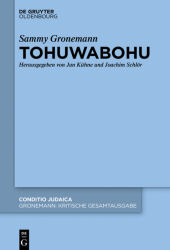 Neuerscheinungen 2019Stand: 2020-02-01 |
Schnellsuche
ISBN/Stichwort/Autor
|
Herderstraße 10
10625 Berlin
Tel.: 030 315 714 16
Fax 030 315 714 14
info@buchspektrum.de |

Sammy Gronemann, Jan Kühne, Joachim Schlör
(Beteiligte)
Tohuwabohu
Herausgegeben von Kühne, Jan; Schlör, Joachim
2019. XXIV, 323 S. 230 mm
Verlag/Jahr: OLDENBOURG; DE GRUYTER OLDENBOURG 2019
ISBN: 3-11-062549-0 (3110625490)
Neue ISBN: 978-3-11-062549-3 (9783110625493)
Preis und Lieferzeit: Bitte klicken
Sammy Gronemanns erster literarischer Erfolg ist der 1920 erstmals erschienene Bestseller "Tohuwabohu". Dieser satirische Zeitroman markiert den Beginn von Gronemanns literarischer Karriere und zeichnet ein humorvolles Porträt jüdischen Lebens in Berlin nach der Jahrhundertwende. Für Albert Einstein war es ein "Meisterwerk", in dem die verschiedenen Strömungen im deutschen Judentum hellsichtig dargestellt sind. Mit dem für Gronemann charakteristischen Humor erzählt der Roman von der Begegnung deutscher Juden mit der osteuropäisch-jüdischen Kultur - aus dem einzigartigen Blickwinkel des Begründers des zionistischen Lustspiels. Gronemanns vielfach übersetzter Roman begründet auch die wissenschaftliche Rezeption seines Werkes. Die vorliegende kritische Ausgabe erschließt, unter Verwendung bislang unveröffentlichtem Archivmaterials, die Intertextualität und die literarisch-historischen Kontexte des Romans; Rezeptionsgeschichte sowie Forschungsstand werden darin zusammengefasst und neue Perspektiven eröffnet.
This book-series, initiated in 1992, has an interdisciplinary orientation; it comprises research monographs, collections of essays and annotated editions from the 18th century to the present. The term German-Jewish literature refers to the literary work of Jewish authors writing in German to the extent that Jewish aspects can be identified in these. However, the image of Jews among non-Jewish authors, often determined by anti-Semitism, is also a factor in the history of German-Jewish relations as reflected in literature. This series provides an appropriate forum for research into the whole problematic area.
This book-series, initiated in 1992, has an interdisciplinary orientation; it is published in English and German and comprises research monographs, collections of essays and editions of source texts dealing with German-Jewish literary and cultural history, in particular from the period covering the 18th to 20th centuries.
The closer definition of the term German-Jewish applied to literature and culture is an integral part of its historical development. Primarily, the decisive factor is that from the middle of the 18th century German gradually became the language of choice for Jews, and Jewish authors started writing in German, rather than Yiddish or Hebrew, even when they were articulating Jewish themes. This process is directly connected an historical change in mentality and social factors which led to a gradual opening towards a non-Jewish environment, which in its turn was becoming more open. In the Enlightenment, German society becomes the standard of reference - initially for an intellectual elite. Against this background, the term German-Jewish literature refers to the literary work of Jewish authors writing in German to the extent that explicit or implicit Jewish themes, motifs, modes of thought or models can be identified in them.
From the beginning of the 19th century at the latest, however, the image of Jews in the work of non-Jewish writers, determined mainly by anti-Semitism, becomes a factor in German-Jewish literature. There is a tension between Jewish writers´ authentic reference to Jewish traditions or existence and the anti-Semitic marking and discrimination against everything Jewish which determines the overall development of the history of German-Jewish literature and culture. This series provides an appropriate forum for research into the whole problematic area.


